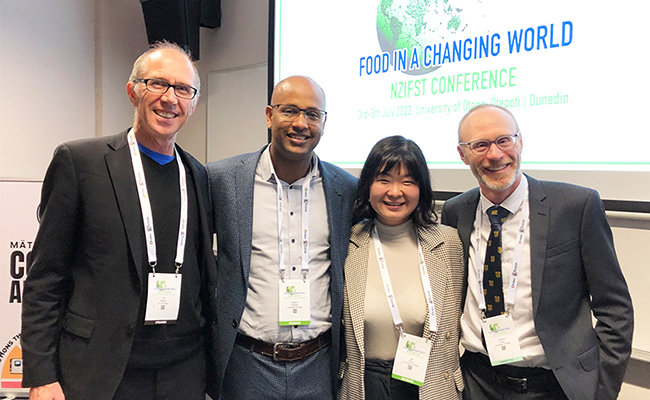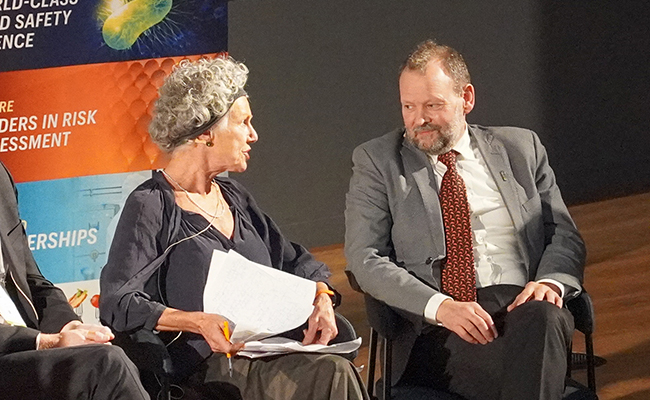
Department of Food Science researchers present in a Sensory and Flavour session at this week's NZIFST Conference (from left): Pat Silcock, Dr Biniam Kebede, Dr Mei Peng and Associate Professor Graham Eyres.
It's all about building research collaborations this week for Department of Food Science researchers taking part in the New Zealand Institute of Food Science & Technology (NZIFST) Conference on the Dunedin campus.
Almost 300 delegates from around the world have travelled to Dunedin for the three-day 59th Annual NZIFST Conference that was last held in Dunedin in 2001.
Associate Professor Graham Eyres has been leading the local organising committee for the NZIFST Conference, and as an undergraduate student at the time, also attended the 2001 conference.
He says over the last two decades there's been a huge amount of change in the food industry and the theme for this year's conference, Food in a Changing World, recognises the industry is operating in an environment where the only constant is change.
“As a small country, New Zealand is strongly affected by the global environment and external pressures, such as disruptions to supply chains, work force shortages, climate change, sustainability targets, political unrest, and ongoing impacts of the COVID-19 pandemic,” Associate Professor Eyres says.
The aim of the 2023 conference is to better understand the drivers of change and how the food industry and NZIFST can respond to provide the best possible future of food in Aotearoa New Zealand.
In exploring the theme, the plenary speakers and session topics have covered a wide breadth of connected topics including food integrity and security, science insights into food safety, quality and health, food waste and sustainability, mātauranga Māori, and reflections on what may constitute a 'new normal' for Aotearoa's future food industry.
The conference will also be Poutoko Taiea, Distinguished Chair Professor Phil Bremer's final one as President of the NZIFST. Professor Bremer says the discussions held this week have been invaluable for reflecting on how the research environment and the food industry is changing and how the NZIFST can change and adapt its activities to best add value to its members and the food industry.

Poutoko Taiea, Distinguished Chair Professor Phil Bremer sits on a panel chaired by RNZ National Presenter Kim Hill discussing the future of food and what it means for New Zealand producers and consumers.
Coinciding with the current International Science Festival in Dunedin, a series of public events also took place at the conference, in conjunction with a meeting of the New Zealand Food Safety and Science Research Centre.
On Monday, RNZ National Presenter Kim Hill chaired an expert panel discussing the future of food and what it means for New Zealand producers and consumers. The Prime Minister's Chief Science Advisor, Dame Juliet Gerrard, also joined a forum discussing food waste, a current major project for her office involving Otago's Food Waste Innovation research theme.
With support of the Patricia Coleman fund, Professor Philip Marriott, who is based in the School of Chemistry at Monash University, also travelled from Australia to participate in the conference.
While in Dunedin, Professor Marriott, who is a global expert in advanced analytical techniques, will present the Patricia Coleman Public Lecture. The lecture titled Earth, Wind, Fire and Water: Advanced Separation Methods for Chemical Discovery, will discuss methods for chemical discovery in essential oils, food, drug and petroleum applications.
The annual public lecture recognises the contribution of Emeritus Professor Coleman as Dean of the (then) Faculty of Home Science for almost 25 years (1962-1986). The lecture will take place in Castle 1 Lecture Theatre on Monday, 10 July, from 5.30-6.30pm.